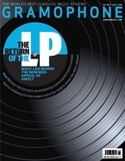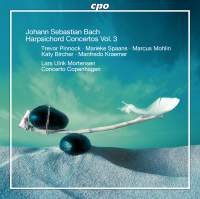Texte paru dans: / Appeared in: |
|
|
Outil de traduction (Très approximatif) |
|
|
Reviewer:
Jonathan
Freeman‑Attwood The concertos for multiple harpsichords from the 1730s are, for the most part, transcriptions from lost earlier (or near-contemporaneous) sources for other instruments – mostly violins, one suspects – but beautifully recrafted by Bach for his Collegium Musicum concert series in Leipzig. Indeed, the vision of father, sons and pupils performing these works in Zimmermann’s coffee shop has tended to deflect snobbery that these versions are somehow ‘second class’; in any case, most of these works only exist for ‘claviers’, so the issue is decidedly moot.
There’s nothing moot about these strong and satisfyingly direct readings. While nominally helmed by Lars Ulrik Mortensen, his partner in crime is the indefatigable Trevor Pinnock (whose own performances for Archiv in 1980 remain a durable collection for any library) and from the outset the music-making seems to be predicated on gracious partnership and delight in exchange.
Of the three double concertos, BWV1060‑62, the famous ‘violin double’ always presents the greatest challenge, mainly because the ‘holy grail’ Adagio has none of the visceral qualities of solo strings dovetailing, yearning and yielding with their varying timbres and sustained vocalising. The answer on the harpsichord resides in this touchingly articulated, delicately unfolding essay of exquisite intimacy. The wonder of this creation is lessened not a jot in its new clothes. Much of the success of these slow movements is the quiet nobility of the embellishment, spontaneous, unselfserving and experienced.
The recreational spirit which must have characterised the Collegium Musicum concerts perhaps encourages one to excuse the slightly rough-and-ready string-playing of Concerto Copenhagen: incongruous blend and unsteady rhythm, especially in the outer movements, rears its head intermittently. Yet there is always something to be said for an approach that allows room for discovery at the point of execution.
Certainly, compared to the meticulously regulated performances of Andreas and the Freiburg Baroque Orchestra in their recent solo concerto recordings (Harmonia Mundi, 9/15), these readings are considerably less highly wrought. A refreshing lack of artfulness here, confirmed by each of the triple concertos delivering unaffected and energised performances, more than makes up for it. While stylistically poles apart, they convey the same joyful, uninhibited spirit as the Württemberg Chamber Orchestra and Jörg Faerber from the late 1970s.
|
|
|
|
|
|
Cliquez l'un ou l'autre
bouton pour découvrir bien d'autres critiques de CD |
|




